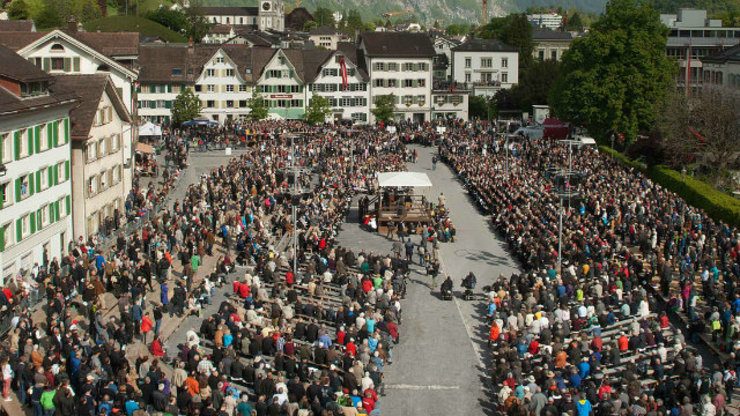SUMMARY
This is AI generated summarization, which may have errors. For context, always refer to the full article.
 The residents of the Canton of Glarus and the Canton of Appenzell Innerrhoden in Switzerland have a curious tradition. Every year, on the first Sunday of May (last Sunday of April in Appenzell Innerrhoden), residents make their way to the town square at midday. The town square is sealed off with barricades, and only men clutching a bayonet or an heirloom ceremonial sword, or women carrying their voting cards, are permitted entry.
The residents of the Canton of Glarus and the Canton of Appenzell Innerrhoden in Switzerland have a curious tradition. Every year, on the first Sunday of May (last Sunday of April in Appenzell Innerrhoden), residents make their way to the town square at midday. The town square is sealed off with barricades, and only men clutching a bayonet or an heirloom ceremonial sword, or women carrying their voting cards, are permitted entry.
This strange proof of identity in Appenzell Innerrhoden originates from the time when only the men who were willing to bear arms to defend their community were given the right to vote. Women, in contrast, were only permitted full rights in 1991.
At high noon, a procession – complete with marching band, banners, and uniformed guards – escorts officials from the town hall to the plaza. At the town square is a raised platform, very similar to a boxing ring, where the town officials stand in traditional garb. The local leader greets the crowd and gives a speech, while the audience listens in rapt attention.
This is no riot nor protest action. This is not a Pacquiao prizefight.
This is a session of the Landsgemeinde, the cantonal assembly, the highest deliberative body of both the Glarus and Appenzell Innerrhoden communities.
For as long as 3 hours, some 5,000 residents stand to vote to fill local positions, to approve or deny funding for local government spending projects, and to pass or reject laws of local or national application.

Only the disabled or elderly are given seats. Yet the procedure, for a crowd that size, is remarkably orderly and businesslike without heckling, applause, or catcalls.
After the leader greets his constituents, he presents the financial accounts of the community, and the process begins. Hands, some holding voting cards, rise and fall as each proposal is presented. In the rare event of a close vote, the assembly is divided – with the crowd departing through two exits, one for those in favor, and the other for those against the motion. After the formal order of business is completed, the open session begins, where any draft law may be introduced by anyone, and anyone present can propose a course of action.
This is the Swiss experience of direct democracy. It has been in practice – with variations – since around the time Magellan reached Philippine shores.
Filipinos as community legislators
While there have been recent, well-publicized initiatives to scrap the pork barrel system and to introduce greater transparency in government through indirect means, few Filipinos are aware that they, too, have direct individual voice, vote, and guaranteed seats in a neighborhood congress of their own, just like the Swiss. This is in the form of the long-overlooked institution known as the Barangay Assembly.
First, let’s be very clear. The Barangay Assembly is not held. The Barangay Assembly is not conducted. The Barangay Assembly is convened, just like Congress. It is the deliberative assembly of the collective neighborhood, a co-equal branch of the barangay government, just like the Lupong Tagapamayapa, the barangay justice system.
Originally established in 1960, and existing since 1991 by virtue of Sections 397 and 398 of the Local Government Code, the Barangay Assembly convenes in regular session at least twice a year, in accordance with Presidential Proclamation Number 260, dated September 30, 2011. It can also convene quarterly, monthly, or even weekly, if the neighborhood residents will it.
The presence of the officials of the barangay government are not necessary – neighbors can discuss community issues and brainstorm solutions by themselves, if need be.
The first Synchronized Barangay Assembly Day for 2014 was last March 29.
Members of the Barangay Assembly
Filipinos aged 15 and above and resident in the barangay for at least 6 months – no need to be a registered voter – are members of the Barangay Assembly. They have the inherent individual right to do everything a senator or congressman does, with respect to the barangay. They can:
- Introduce and deliberate local law and policy (such as a Barangay Freedom of Information Ordinance)
- Demand a detailed accounting of barangay finances
- Require the presentation of official barangay meeting minutes and documents
- Require answers to the tough and specific questions that every Filipino citizen
What to expect
DILG Memorandum Circular 2014-100 directs barangay governments nationwide to convene their respective Barangay Assembly on October 12.
If the Punong Barangay does not convene the Barangay Assembly, citizens can still conduct the meeting without the Punong Barangay or any barangay official at all, in accordance with Section 397 (c) of Republic Act 7160, The Local Government Code of 1991, as amended. Any barangay resident can also report this violation directly to the Office of the Ombudsman and hold the Punong Barangay accountable.
At that Barangay Assembly, officials are required to, among others:
- Deliver their Accomplishment Report for the first semester of 2014
- Present their First Semester Financial Report, including Itemized Monthly Collections and Disbursement, and the Summary of Income and Expenditure
- Determine and discuss compliance with DILG Memorandum Circular 2014-81, requiring the visible public posting of Barangay Financial and Procurement Documents, both online and outside the barangay hall
- Report on the Task Force on Youth Development and the youth budget, which comprises 10% of the total barangay budget
“Failure by the local treasurer or the local chief accountant to post the itemized monthly collections and disbursements of the local government unit concerned within ten (10) days following the end of every month and for at least two (2) consecutive weeks at prominent places in the main office building of the local government unit concerned, its plaza and main street, and to publish said itemization in a newspaper of general circulation, where available, in the territorial jurisdiction of such unit, shall be punished by a fine not exceeding Five hundred pesos (P500.00) or by imprisonment not exceeding one (1) month, or both such fine and imprisonment, at the discretion of the court.”
The agenda provided by DILG is only recommendatory – members of the Barangay Assembly can control the agenda to suit their community needs, and can take as much time as they need to ask questions from the barangay officials.
The Barangay Assembly cannot be adjourned without the consent of a majority of the members present.
Microcosm
Every barangay is a microcosm of the nation
We have to fight the mindset that “just” because it’s the barangay, it’s not worthy enough to hold one’s attention.
Not many realize that barangays nationwide collectively control billions of pesos in taxpayer funds, and that without proper civic oversight, capital that could have been used to fund high-impact development projects just goes to waste.
National civic initiatives on transparency and discretionary funding can begin right at the barangay level.
The structure, law, and regulations are already in place. All that is needed is willpower on the part of individuals and communities to exercise meaningful oversight functions, ensure the proper implementation of the spirit of the law, and guarantee that officials consistently walk their talk and deliver on their promises in a timely manner.
One simple act of civic duty can cause a ripple and generate a virtuous cycle of community responsibility. Your presence and active participation at the Barangay Assembly is a significant push in the right direction. One spoken word could easily inspire others to find their own voices. As the barangay goes, so does the nation.
Remember: elective and appointive barangay officials work for you. They are public servants. We should expect and demand better service, what with all the money we pay them before we even receive our own paychecks. – Rappler.com
The next Synchronized Barangay Assembly Day is on Sunday, October 12, 2014.
Lou Gepuela believes that sustained public engagement with government and continued community empowerment is the missing link in fixing a significant portion of society’s ills. He spent the last 5 years learning and applying process improvement, people management, and customer care skills in the local BPO industry.
Image from Wikimedia Commons.
Add a comment
How does this make you feel?
There are no comments yet. Add your comment to start the conversation.